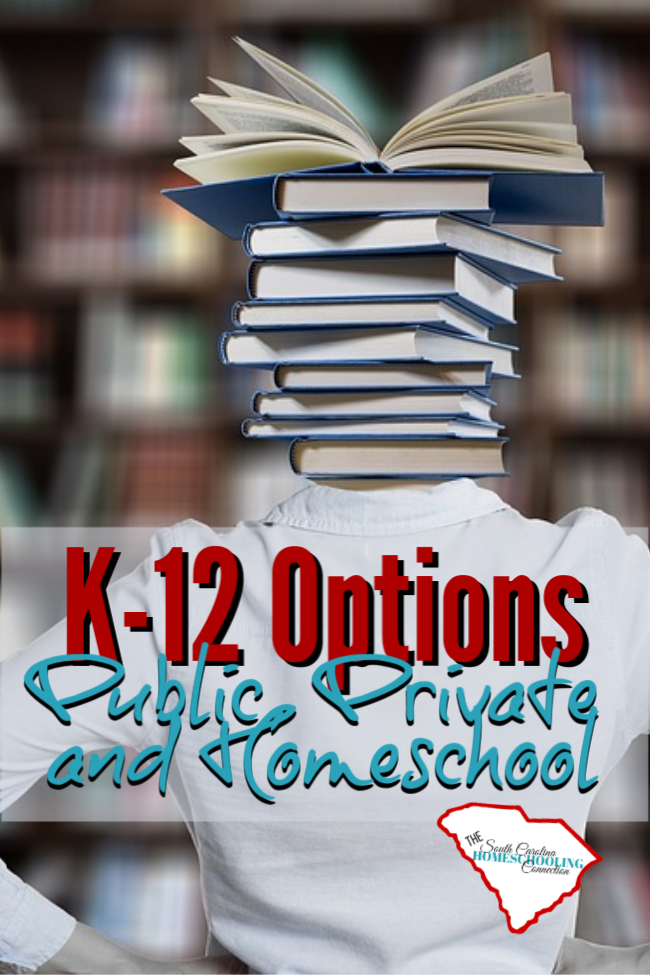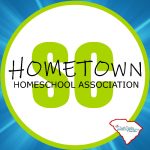Compulsory attendance law says that when child turns five years old by September 1, the student is required to attend school. Somewhere. When you decide to enroll somewhere outside the traditional brick-and-mortar building, it gets a bit more confusing. For example: K-12 program options fall under Public, Private and Homeschool attendance laws.

Many curriculum programs (like K-12) cater to homeschoolers nationwide. Curriculum vendors want to sell their products to as many customers as possible. So, it makes sense they would market their curriculum to public, private and home school buyers. But, these programs do not necessarily meet the requirements for compulsory attendance in South Carolina.
The various options are great for individualizing your child’s education. The definition lines in marketing ads are blurry. So let’s help clarify the differences between the online public schools, private schools and homeschools. Most importantly, do you need to register with a homeschool association or not?
K-12 Program Options
Online Curriculum or School?
I was recently talking to a vendor for the K-12 program at local homeschool convention. She explained the various options that K-12 curriculum has available for students to learn outside the brick-and-mortar school. There are some important differences between the K-12 options, including prices. Also, some important differences in the code of law that the program can operate under.
It especially matters if your student is transferring to another school or graduating, because it will determine who has the authority to send official school records. If you have enrolled in a program that includes transcripts/report card preparation, but they are not recognized as a school in SC–then your high school graduate may not be eligible for state scholarships. If your high school student is going to the DMV, you must provide verification of school attendance too. These are just a few of the common issues that come up.
If you’re looking at any other online program, this can help you understand whether or not the program is an online curriculum…or if it meets the compulsory attendance requirements of a school. It can be confusing. So, let’s point out the differences with the K-12 program variations.
Public Charter Schools Online
K-12 has a Public Charter School online. In many ways, these public school families feel like they’re homeschooling. They may even call themselves “homeschoolers.” They may even join some homeschool support groups to get to know others who are outside the classroom.
But, this is a charter school that you attend at home. It’s a school under the charter school SC Code of Law 59-40-20. It’s free. Which is very appealing for many of us on a single income. Certified teachers oversee and grade the schoolwork. They set the pace and deadlines for completing the work. They set 180 mandatory attendance days. Enrollment is for full-time students, even in Kindergarten. This is all appealing to share that weight of responsibility.
These public charter schools utilize the K-12 curriculum:
- Cyber Academy of SC
- South Carolina Virtual Charter School
- Destinations Career Program at Cyber Academy
- We have other charter public schools that utilize a different state-approved curriculum, too.
Part-time enrollment program: It’s important to note that we have another state-approved part-time program, called Virtual SC. This public funded program operates under SC Code of Laws 59-16-15. It’s not classified as a school.
Virtual SC is a supplemental program for public school, private school and homeschool students. It’s a way to get classes that may not be available at a local school or may not fit into the student’s schedule. Courses are accredited, facilitated by a certified teacher, and graded by the teacher. Virtual SC reports the courses/credits back to the primary school to be included on a cumulative transcript.
I compare private school programs online with the example of Virtual SC. This public funded program that doesn’t meet the requirements of a school because it is intended for part-time enrollment. It’s a supplement to individualize education. You still need to be registered with a homeschool accountability association.
Private Schools Online
K-12 has private funded online programs. These participants are outside of the brick-and-mortar building and they are paying for the program themselves. There’s teachers who oversee and grade the coursework. Record-keeping also includes report cards/transcripts and attendance. It’s accredited. That can help you jump thru the eligibility requirements such as NCAA. It’s an appealing option to help us share that weight of responsibility with some experts.
These private funded programs utilize K-12 curriculum:
Private schools operate under the SC Code of Laws 59-65-10A: “A parent or guardian shall require his child to attend regularly a public or private school or kindergarten of this State which has been approved by the State Board of Education, a member school of the South Carolina Independent Schools’ Association, a member school of the South Carolina Association of Christian Schools, or some similar organization, or a parochial, denominational, or church-related school, or other programs which have been approved by the State Board of Education.“
Where’s the list of approved private schools though? I found the following links provided by the South Carolina Department of Education (SCDE) as a courtesy to the public. These links can help us find information regarding private schools in South Carolina. Let’s check the online “school” or program to see if it is listed/recognized by these organizations as private schools:
- SCISA member schools: South Carolina Independent School Association
- NAIS member schools: National Association of Independent Schools
- Private School Review: Local brick and mortar private schools
I found Keystone School on a list, but not the other private schools K-12 programs. So be sure you’re getting your money’s worth for these online programs. Will it be sufficient for college admissions and state scholarships? The DOE also states that they do not authorize or oversee private schools. Which is also what they say about homeschool associations. You’re on your own to figure out if the record-keeping services actually open the doors of opportunity you need.
Homeschool directors are local South Carolina experts, many of us attend guidance counselor meetings with the Commission on Higher Ed and College Board. We understand how to calculate the SC GPA. You may still want to enroll with an association that will help format your final transcript with SC’s Uniform Grade Scale.
If your student is part-time, you should still be registered with a homeschool association to be sure you meet the attendance requirements in SC. Even if your student is technically full-time, I still recommend that you join an accountability association to be sure you meet the attendance requirements in SC. Plus, association directors are your local ally.
Homeschool Curriculum Online
K-12 also has their curriculum available for homeschoolers to use independently for K-8th grade. At your own pace, without a teacher. This an appealing option for many people who want to follow a more traditional program. By following the same program that is state approved, you will cover all the same objectives. With the freedom of setting your own pace and keeping your own grades and lesson plans.
There are dozens of online programs that you could use for your homeschool. That is the beauty and freedom of homeschooling. You *GET TO* choose which programs will work best for your student. I’ve talked before about a few of the popular quick start programs for getting started right now. Be sure to also enroll with an accountability association!
I’ll say it again. Be sure to enroll with an accountability association so you are exempt from compulsory attendance.
A program can offer lots of great services that convince you to buy it and use it. Especially if you’re not sure of your own qualifications to homeschool or you are only going to homeschool short-term.
- Accredited. Bear in mind that if the program claims to be “accredited” it’s the teacher-led version that is accredited, not the curriculum itself.
- Professional, credentialed teachers and advisers who oversee and grade the schoolwork.
- Record-keeping services, including attendance records, report cards and transcripts.
These are all valid selling points. I’m not trying to talk you out of using these kinds of programs. But, does it satisfy the requirements of compulsory attendance? I want to be sure whether you need to register with an accountability association or not. If you’re still not sure, feel free to contact me with questions.
Read more at my Homeschool Curriculum Directory:
Homeschool Adventures: Learning Through the Power of Field Trips (Live, Learn, Work at Home)














 School Choice Rally for Education in South Carolina
School Choice Rally for Education in South Carolina How to Start Homeschooling Mid-Year
How to Start Homeschooling Mid-Year Meet the NEW Director at TSCHAA
Meet the NEW Director at TSCHAA Hometown Homeschool Association
Hometown Homeschool Association




Speak Your Mind